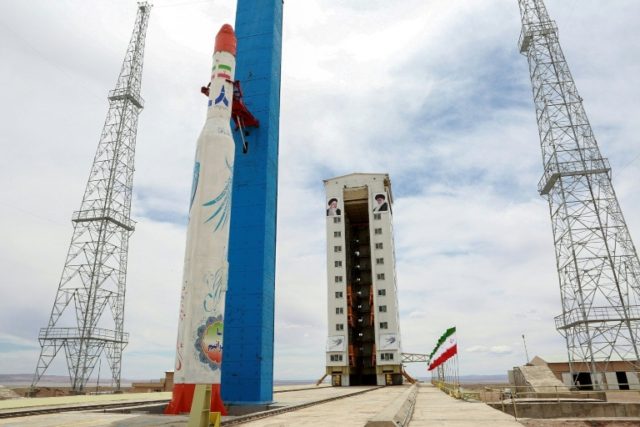Satellite images released on Wednesday revealed what appeared to be a satellite launch from Iran’s Imam Khomeini Space Center.
The United States argues that such launches violate U.N. Security Council resolutions against Iran’s nuclear missile program. The Iranian government has not officially acknowledged the launch took place.
The evidence for a satellite launch is almost comically straightforward: photos released by the DigitalGlobe company of Colorado showed a rocket sitting on the Imam Khomeini Space Center launch pad on Tuesday. When another series of satellite photos was taken on Wednesday, the rocket was gone and the launch pad was discolored with apparent scorch marks.
“In the images, words written in Farsi in large characters on the launch pad appeared to say in part ‘40 years’ and ‘Iranian made,’ in different sections. That is likely in reference to the 40th anniversary of Iran’s Islamic Revolution, which authorities have been celebrating this month,” the Associated Press reported on Thursday.
NPR quoted another satellite imaging company, San Francisco-based Planet, which saw the same signs of activity at the launch site and noted the same burn marks on the pad after the rocket disappeared.
Although Iranian media was quiet about activity at the space center, it previously boasted that a new satellite launch was imminent. Iran made a failed attempt to put a satellite in orbit in January using a different class of rocket. Iranian officials openly admitted to the January effort, saying it failed because the third stage of the launch vehicle did not achieve the speed necessary to reach orbit.
The Jerusalem Post was among the observers on Thursday who assumed the new launch also failed because Iranian officials and state-controlled media outlets are not talking about it. Iranian media could be expected to trumpet any sort of technological triumph, and any act of defiance against the United States, during the ongoing celebration of the Islamic revolution’s 40th anniversary.
If a launch did occur, it would mark Iran’s fifth attempt to reach orbit with the liquid-fueled Safir vehicle, technology Iran acquired from North Korea.
U.S. Secretary of State Mike Pompeo condemned Iran’s satellite launches after the first attempt in January, citing them as evidence Tehran is “pursuing enhanced missile capabilities that threaten Europe and the Middle East.”
Pompeo said Iran’s purported satellite launch systems incorporate “technologies that are virtually identical and interchangeable with those used in ballistic missiles, including intercontinental ballistic missiles.”
Iran denies charges that it uses satellite launches as cover for ballistic missile research and insists the U.N. Security Council resolutions invoked by the United States merely “recommend” Iran abstain from missile testing, rather than banning it outright.

COMMENTS
Please let us know if you're having issues with commenting.